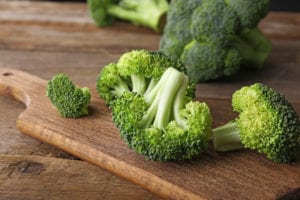Written by Greg Arnold, DC, CSCS. Study shows individuals consuming 98.9-140.5 grams of cruciferous vegetables per day had 6% lower levels of inflammatory protein.
 Although inflammation is “a crucial protective mechanism” that helps repair tissue, protect the body against infection, and is a normal reaction by our immune system to help keep us healthy, too much inflammation can have disastrous health consequences. Specifically, chronic inflammation is a cornerstone of nearly all our major chronic diseases including heart disease, dementia, arthritis, and type 2 diabetes (1, 2), which cost our healthcare system $448 billion (3), $156 billion (4), $128 billion (5), and $174 billion per year (6), respectively.
Although inflammation is “a crucial protective mechanism” that helps repair tissue, protect the body against infection, and is a normal reaction by our immune system to help keep us healthy, too much inflammation can have disastrous health consequences. Specifically, chronic inflammation is a cornerstone of nearly all our major chronic diseases including heart disease, dementia, arthritis, and type 2 diabetes (1, 2), which cost our healthcare system $448 billion (3), $156 billion (4), $128 billion (5), and $174 billion per year (6), respectively.
Consumption of vegetables, specifically cruciferous vegetables (broccoli, cauliflower, cabbage, kale, brussel sprouts, and bok choi) has been shown to be effective against chronic disease due to their high levels of antioxidants called isothiocyanates and indoles (7, 8, 9). Now a new study (10) has identified specific inflammatory proteins targeted by cruciferous vegetables.
In the study, researchers analyzed food frequency questionnaire (11) data over the course of a year on 1,005 women aged 40 to 70 who participated in the Shanghai Women’s Health Study (12). They then analyzed blood and urine samples provided by the women over the course of the year to measure for inflammation and markers of cell damage.
The researchers found a specific benefit of cruciferous vegetable consumption and inflammation levels. Specifically, those consuming 98.9-140.5 grams per day of cruciferous vegetables had 6% lower levels of an inflammatory protein called TNF-alpha (5.24 vs. 5.57 picograms/milliliter, p < 0.05) and 6.8% lower levels of another inflammatory protein called IL-6 (3.43 vs. 3.68 pg/mL, p < 0.05) compared to those eating less than 42.5 grams of cruciferous vegetables per day. No additional benefit was seen with cruciferous vegetable consumption above 140.5 grams per day and no significant differences were seen regarding cell damage between the two groups.
Citing a 2011 study (13) showing cruciferous vegetable consumption to produce a 22% decreased risk of death and a 31% reduced risk of cardiovascular disease, the researchers concluded that “this study suggests that higher intake of cruciferous vegetables is significantly associated with lower circulating levels of inflammatory markers in women.”
Source: Jiang, Yu, et al. “Cruciferous vegetable intake is inversely correlated with circulating levels of proinflammatory markers in women.” Journal of the Academy of Nutrition and Dietetics 114.5 (2014): 700-708.
© 2014 by the Academy of Nutrition and Dietetics.
Posted April 21, 2014.
Greg Arnold is a Chiropractic Physician practicing in Hauppauge, NY. You can contact Dr. Arnold directly by emailing him at PitchingDoc@msn.com or visiting his web site at www.PitchingDoc.com
References:
- Gil, Polyunsaturated fatty acids and inflammatory diseases, Biomedicine and Pharmacotherapy 56 (2002) (8), pp. 388–396
- I.A. Shiels, S.M. Taylor and D.P. Fairlie, Cell phenotype as a target of drug therapy in chronic inflammatory diseases, Medical Hypotheses 54 (2000) (2), pp. 193–197.
- “Cardiovascular Disease at a Glance” posted on the CDC website
- “The Cost of Dementia: $156 billion and rising” posted on WebMD June 20, 2005
- Arthritis – Data and Statistics” posted on the CDC website
- “Direct and Indirect Costs of Diabetes in the United States” posted on the American Diabetes Association website
- Block G, Patterson B, Subar A. Fruit, vegetables, and cancer prevention: A review of the epidemiological evidence. Nutr Cancer 1992;18(1):1-29.
- Zhang X, Shu XO, Xiang YB, et al. Cruciferous vegetable consumption is associated with a reduced risk of total and cardiovascular disease mortality. Am J Clin Nutr. 2011;94(1):240-246.
- World Cancer Research Fund, American Institute for Cancer Research. Food, Nutrition, Physical Activity, and the Prevention of Cancer: A Global Perspective. Washington, DC: AICR; 2007.
- Jiang Y Cruciferous Vegetable Intake Is Inversely Correlated with Circulating Levels of Proinflammatory Markers in Women. J Acad Nutr Diet 2014 Mar 12. pii: S2212-2672(13)01891-1. doi: 10.1016/j.jand.2013.12.019. [Epub ahead of print]
- Shu XO, Yang G, Jin F, et al. Validity and reproducibility of the food frequency questionnaire used in the Shanghai Women’s Health Study. Eur J Clin Nutr. 2004;58(1):17-23
- Yang G, Gao YT, Shu XO, et al. Isothiocyanate exposure, glutathione S-transferase polymorphisms, and colorectal cancer risk. Am J Clin Nutr. 2010;91(3):704-711
- Zhang X, Shu XO, Xiang YB, et al. Cruciferous vegetable consumption is associated with a reduced risk of total and cardiovascular disease mortality. Am J Clin Nutr. 2011;94(1):240-246.
